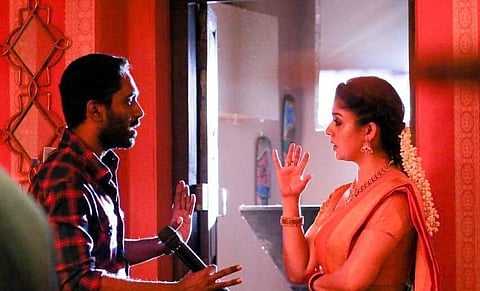

KM Sarjun's rise to fame is a unique story. He's a filmmaker who commanded fan-following even before the release of his first feature film. Pegged as a feminist filmmaker on account of his short films, Maa and Lakshmi, he is now back into the limelight with another woman-centric film, but this time, featuring a star, Nayanthara. His Airaa will also be the first film to feature her in dual roles. In this freewheeling chat, Sarjun opens up about the feminist filmmaker tag, working with Nayanthara, and what it’s like to work with a female co-writer.
After Maa, I remember you mentioning that you will do a film that trashes all the tags that people have pegged you with. You're back though with another woman-centric story.
To be honest, horror isn't quite my genre. So, you can say this isn’t my comfort zone. I have retained my strengths though, and luckily, the film gave me that space.
Nayanthara plays a double role in this film for the first time. You have her playing one character for the image she has and the other for what you wanted to do.
Initially, she wasn't supposed to play the character, Bhavani. But as we were scripting, Bhavani's character gained in strength. Everyone in the team wondered why she shouldn’t play this role too. So we pitched it to her but only after we thoroughly decided everything that had to be done — the makeup needed to be different, the shooting schedules would get more complicated. But we knew the film would get bigger.
When we asked her, she took a couple of days to decide. She wanted a makeup test; we did one in black and white, and she was convinced.
Did the business aspects dictate her choice to play Bhavani?
I don't worry about business when I write. I started rooting for Bhavani even when we were scripting, even though the other character, Yamuna, has more screen space. If everyone is rooting for that character, and I use another artist to play that role, I wondered what would happen. As we were rooting for Bhavani, we felt that the audience would too. So we asked ourselves if it wouldn't be good to have Nayanthara play the role.
A question does arise whether it is really necessary to use dark makeup to an actor instead of say, casting a dark-complexioned person...
I did see comments asking me about it, but I think you can't really ask that question. She is Nayanthara. Perhaps I can bring another person to play the role. But when I have a star who can do both, why should I miss that? The expectations, the business… everything goes up. You could probably ask this about a small-budget film, but not here.
You seem to have a fascination for shooting in black and white.
I think it began when I watched Satyajit Ray's Charulatha. Something just hits you when you watch it. Frances Ha (2012) is another such film. The more I started watching black and white films, my interest grew. The entire film would be in monochrome and yet, every frame would be interesting. We are scared of using black and white here. Even for flashbacks, we prefer to use a sepia tone. People consider it a risk.
Why do you think that is?
Shooting in black and white requires work. Frames cannot be normal; they need to be decorated. Patterns have to be brought in; lines and curves need to be used. You can't wear a normal shirt; it has to be checked. The frame looks good only if you work on the art and the costumes. It could be because of that. But it was a challenge I loved. There's a house in the film that comes both in black and white and colour, but it looks better in monochrome as we have decorated it that way.
The Nayanthara effect
Chaos on the sets is quite natural. Sometimes, when I got busy, Nayanathara would make one loud call for silence, and the entire set would go quiet. I loved that; it is a proper Nayanthara moment. I would joke that they didn’t listen to me. We see only heroes and directors hold that command. I consider this progress, and it happens only because it is Nayanthara.
You are one of the few directors who use the skills of a writer, specifically that of a woman. How important is it to have that female perspective?
Airaa is a woman-centric film, and Priyanka Ravi has written the story and screenplay for it. We collaborated right from the beginning. My biggest asset was that I could concentrate more on the other departments of production and stop worrying about writing. My job was limited to conveying whether I liked the scenes or not.
That said, I wouldn’t say that having a female perspective for a woman-centric film is mandatory; if you have that option, it is good. K Balachander sir made several classic women-centric films that he wrote, and you can't ask him how he did that. It becomes about choices. When I write a scene, I place myself in the shoes of that woman. My reactions subconsciously get transferred to the character’s. A woman writer places herself in that position too. I get multiple options then — mine, hers, or both. Everything gets better.